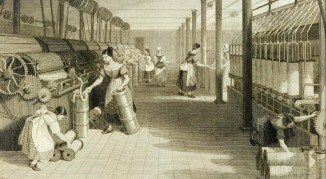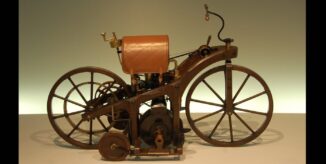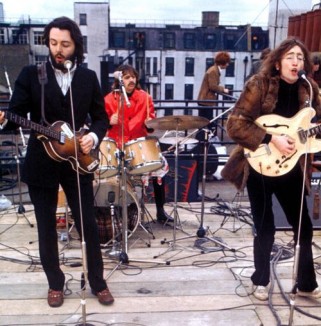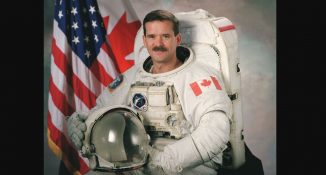26 years ago today, Netflix was incorporated as a DVD mail delivery service. Founders Marc Randolph and Reed Hastings came up with the idea after they heard of Digital Video Disks, and after ruling out VHS as too delicate to ship. Amazon’s Jeff Bezos, after hearing of the Silicon Valley company starting out with 925 titles, offered to buy the business for between $14 and $16 million, but Hastings turned the offer down on the way to it becoming a company with a market cap of $187 billion. READ more about what it became… (1997)

Netflix began on the business model of flat-fee unlimited rentals without due dates, late fees, shipping and handling fees, or per-title rental fees. During the 2000s dot com bubble market crash, Hastings and Randolph offered to sell their business to Blockbuster for $50 million, and were turned down.
A year after going public with an IPO of $15.00 per share, Netflix posted its first profit in 2003, earning $6.5 million on revenues of $272 million; by 2004, profit had increased to $49 million on over $500 million in revenues. In 2005, 35,000 different films were available, and Netflix shipped 1 million DVDs out every day.
In January 2007, the company launched a streaming media service, introducing video on demand via the Internet. It was also present on some gaming consoles like the Xbox 360. Just 1,000 titles were available compared with the 70,000 physical ones. In 2008, the streaming service became free.
In 2010, several deals with all the major Hollywood film studios totaling over $1.5 billion gave Netflix exclusive streaming rights to dozens of brand new films, and a year later, streaming shows and movies on Netflix began accounting for 30% of all internet streaming traffic during peak hours.
In 2011, Netflix announced it was making its own material, starting by outbidding major cable channels for the political drama House of Cards which became a 6-season hit. They followed it up with Orange is the New Black before branching out into dozens of TV shows, documentaries, feature films, and even comedy specials.
MORE Good News on this Day:
- The United Kingdom legislated the abolition of slavery throughout its empire (1833)
- Canadian Thomas Ahearn demonstrated his pioneering electric stove during what is believed to be the world’s very first dinner cooked on an all-electric stove (1883)
- Ingrid Bergman, the actress who won three Academy Awards and was known for her role as Ilsa in Casa Blanca, and for several Hitchcock films, was born (1915)
- The Slovak National Uprising involved 60,000 Slovak troops turning against the Nazis, and is annually honored in Slovakia on this day (1944)
- Michael Jackson, the singer–songwriter and dancer whose music videos for ‘Beat It’, ‘Billie Jean’, and ‘Thriller’ are credited with breaking down racial barriers and transforming MTV, was born in Gary, Indiana. His 1982 album Thriller, is the best-selling album of all time, winning 7 Grammy awards. (1958)
- Nirvana‘s album Nevermind had its world premiere when Boston disk jockey Kurt St. Thomas played the LP from start to finish (1991)
- The Supreme Soviet parliament of the Soviet Union suspended all activities of the Soviet Communist Party. (1991)
On this day 190 years ago, Britain’s 1st Factory Act became law “to regulate the Labor of Children and Young Persons in the Mills and Factories of the United Kingdom.” Born out of a series of legislative acts passed before, and acting as a foundation for more to come later, the 1833 Factory Act written by MP Lord Ashley was the first concrete attempt to grapple with a scourge of child labor, and for the first time limited working hours and imposed age restrictions on factory workers.

In 1832, building on previous work by John Cam Hobhouse, MP Michael Thomas Sadler introduced a bill that prohibited nightly working hours up to age 21, something introduced by Hobhouse, and added that no child under nine was to be employed. The working day for under-eighteens was to be no more than ten hours (eight on Saturday). Some had suggested this was as far as Sadler’s bill was going to go, considering the strong opposition from MPs bought by the Scottish flax spinners and other textile interests.
Sadler took the bill to committee, during which a commission he set up described textile mills as hotbeds for the most ghastly working conditions and exploitations. However Sadler could not get his Factory Bill to a vote before Parliament dissolved, and he lost his seat.
The effort was revived by one Lord Ashley, who set up the Factory Commission in order to iron out the claims that Sadler’s previous investigations (done only by him and close confidants) were biased. Indeed the mills were far from the slave pits described by Sadler, but nevertheless Ashley’s Commission concluded that mill work was hard and long and “resulted in the permanent deterioration of the physical constitution, the production of disease often wholly irremediable: and the partial or entire exclusion (by reason of excessive fatigue) from the means of obtaining adequate education and acquiring useful habits, or of profiting by those means when afforded.”
The 1933 Factories Act was passed, guaranteeing time off for schooling and lunch breaks, limited working hours, as well as the ages when children were legally allowed to be employed, and established routine factory inspections carried out by an independent body. (1833)
138 years ago today, the world’s first motorcycle to use an internal combustion engine was patented by Gottlieb Daimler, who is often called “the father of the motorcycle” for this invention.
Eclipsing the steam-powered two-wheelers that came before it, the Petroleum Reitwagen (‘riding car’) became the forerunner of all vehicles—land, sea and air—that became destined to use this overwhelmingly popular engine type. (1885)

And on this day, in 1966 the Beatles played their last concert before a paying audience — a sold-out crowd of 25,000 at Candlestick Park in San Francisco, California. It was the final show on their American tour, and John and Paul brought cameras on stage to take pictures between songs. They finished the show with a version of Little Richard’s ‘Long Tall Sally’.

And Happy 76th Birthday to Temple Grandin, the Colorado expert on animal behavior who became a public spokesperson for autism and invented the “hug box” for calming those on the spectrum. Diagnosed with autism when she was two, she earned a doctorate degree in animal science from the University of Illinois. She gained worldwide attention as the subject of the Oscar award-winning, semi-biographical film, Temple Grandin.

She loved cows and became an advocate for better conditions in the livestock industry and a best-selling author on both the subjects of animal welfare (Animals in Translation: Using the Mysteries of Autism to Decode Animal Behavior) and autism (The Autistic Brain: Helping Different Kinds of Minds Succeed). In 2010 she was named to Time’s list of the 100 most influential people in the world in the “Heroes” category. (1947)

Happy 64th Birthday to astronaut Chris Hadfield, the Canadian Air Force Commander who became the first Canadian to ever walk in space or command the International Space Station. He gained a fan base of millions on social media when he played guitar and sang David Bowie’s Space Oddity (and other songs) while circling above planet Earth.
Last year he launched an online astronaut master class. Through personal stories about what it’s like to live in space, chalkboard sessions on orbital mechanics, and lectures using model spaceships, the student gets 23 classes for $90-$180. (1959)
SHARE The Milestones, Memories, Movies, and Moon Walks…





















[…] By Good News Network […]